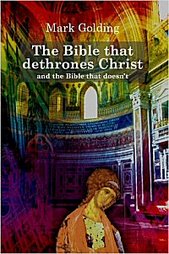“All things have been committed to me by my Father. No one knows the Son except the Father and no one knows the Father except the Son and those to whom the Son chooses to reveal him”
The idea of knowing God by revelation is not new. It has served ancient people back in history since the beginning of time and, until Jesus came upon the scene, the reliability of the revelations about the form, character and will of God has been a somewhat contentious matter. Jesus showed to both the Galileans and the Samaritans that the conduit of the human spirit as a reliable source of knowledge was highly suspect.
For many cultures the greatest difficulty in defining who God is, in terms of specific attributes, is discerning precisely where the external nature and character of God begins and the internal projections of mankind’s imagination upon God ends. The less troublesome solution is the belief that God has no separateness but inhabits everything as an amorphous spirit devoid of a distinct and authoritative personality. Generally known as the pantheistic option it is the easiest to adopt because it requires no obedience to a higher moral authority even though it requires the ego to surrender itself to a higher consciousness of an impersonal being who/that is totally without shape, form, character, will or purpose other than being a large spiritual pool into which the collective human ego is dissolved. Cosmic consciousness does what it says on the tin, ‘Reduces the substance of God to a state of mind’
In a vacuum of identity the human spirit is capable of forming whatever picture of God suits it’s existential purpose in order to find meaning and identity beyond the material comfort of a short and meaningless existence. A myriad of words have been formally canonised by various cultures as reliable scriptures for defining who God is and a priesthood is officially delegated the responsibility of ensuring these canons are written into law and into death as the ultimate weapon of imposing conformity of thought and ideas. Both religion and philosophy have their guiding priests, whether by inspired unction or by scholarly regimes of truth, both roles are simple - to control.
Jesus comes along and turns the whole priesthood idea upside down by saying things that humans aren’t allowed to say. Doing away with priests as the vehicle of definition for the character and form of God he informs his listeners that the priest from heaven has arrived. Some took it rather well, except the priests, philosophers and lawyers. They were threatened by his outright challenge to their authority and they only wanted to see him dead as soon as possible. No man spoke like Jesus. None that have come before him nor none that have lived since can come anywhere near explaining the gravity of eternity. What compelled Jesus to speak in this manner is based on knowledge he brought with him as a person who has always existed. With this knowledge he came as the priest of a canon that is not written anywhere but in the mind of God who came as flesh to dwell among us. He referred to scriptures that his immediate hearers were familiar with and certainly he endorsed whatever agreed with his canon but whatever didn’t, he chucked into the bin. ‘You’ve heard it said, but I say to you this..’
But the priest reveals nothing without it being operated on by the Spirit of God. Jesus words meant absolutely nothing to the world that heard him then and to the world that hears the same words today there is no understanding without his Spirit revealing what the words mean. The few who understood in his time were those to whom the Spirit of God chose to reveal himself and this act of God hasn’t changed since the beginning.
In the next part I will explain exactly the reason why this revelatory understanding is necessary for a relationship with God and why the gnosis way, the way of acquiring knowledge by auditory synthesis without repentance, is an attitude that blocks the open communication channel between God and man. Predestination is a word for eternity that does not fully describe it’s prescient nature. When eternity speaks, it is with words impregnated with the fragility of the present.





No comments:
Post a Comment